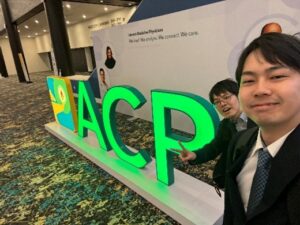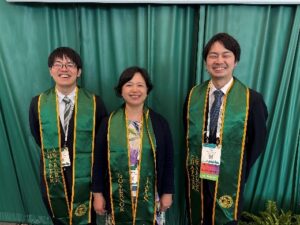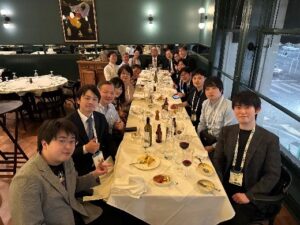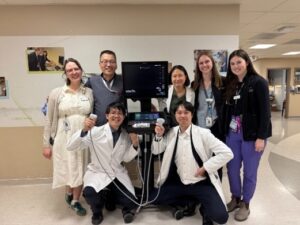ACP Annual Conference Internal Medicine Meeting 2025 Rising Star Scholarship Program 体験記 石原洋
2025年5月8日
国際医療福祉大学 石原 洋
私は今回Rising Star Scholarship Programの恩恵を受け、第二期生として、米国ニューオーリンズで開催された
米国内科学会(ACP)総会、カナダ国アルバータ州カルガリー大学でのポイントオブケア超音波の研修、合計2週間の海外渡航を経験させていただきました。短期留学と言っても良いのではないかと思うくらい、毎日が濃密で、新しい出会いと学びに満ちていました。ACPは想像をはるかに上回る大規模な組織で、今回の総会は世界中の多数の医療従事者が一つの会場に集結して情報交換と学習の時間を共にすることができる壮大な学会でした。多くの他国の先生方とお話することができ、連絡先を交換し、さらに研究の相談にも乗っていただきました。学会スタッフも親切な方ばかりで、講義資料を求める相談に、丁寧にご対応くださりました。感謝申し上げます。
学会ではプレコースから参加し、主に栄養学とプライマリの薬物治療を学びましたが、演者の先生方が原著論文、特にRCTの条件設定をサラリと会話の中に織り交ぜてお話しされていたことが印象的でした。朝8時から17時までの講義でしたが、終始うきうきと拝聴し、夕方になればなるほど面白く、疲労はほとんど感じませんでした。何がわかっていて、何がわかっていないのか、そして何がわかっていないから、どこまで言及していいのか、を相当意識されているようにも思われ、その点が勉強になりました。私の拙い質問にも快くお答えくださり感激しました。ほか身体診察と超音波検査の実技講習(Clinical Skills)にも参加しましたが、やはり科学的根拠が重視された内容で、直接丁寧なご指導をいただきました。チームディスカッションのセッションにも参加しましたが、米国と日本の抱える問題は共通しており、例えば、身体診察が疎かでCTなどの検査が優先されベッドサイドに行く時間が減っている、などの問題点を共有しました。講演や参加者のお話を伺う限り、日本も米国も、医療の水準や、抱えている臨床的・教育的問題は大きくは変わらないと思われました。逆にいえば日本の医療が高水準であることは、まさに先輩たちの功労によって成立しているのだろうと推察しました。
カルガリー大学での超音波診療の研修は、Irene Ma先生とPOCUSチームの皆様の時間を頂き、超音波の基本的事項、実際の診療を見学させて頂きました。Ma先生、チームの先生方が慈悲深く接してくださりました。特にvolume評価について所見の論理的な解釈方法、超音波プローブの当て方まで直接教わることができ、またとない勉強の機会でした。私は超音波の基礎を学び研究のご相談をしたいと考えておりましたので、渡航の目的を完全に果たすことができました。
言語の壁は私の個人的問題でもあり、毎日学習を継続していたにもかかわらず、十分ではなかったことを悔みましたが、万人に通じることで重要なことは英語や知識よりも、己の情熱や、礼節・寛容・利他の精神であると思われました。ACP総会開会式でのReed Tuckson先生の演説は、他人のために尽くす情熱を思い出し、患者さんはもちろん、同僚も含めて周りの人たちみんなを大事にしようという、医療者の初心を振り返るよう激励する内容も含まれていましたが、こうしたマインド、すなわち広義の「思いやり」こそが、重要であり忘れてはならないのだと振り返りました。移動中のタクシーや、レストラン、空港の待合室でも、海外の人たちとお話しする中で同様のことを感じ、自らの生活を反省する良い機会になりました。
私がこの2週間を通し学んだことは膨大でとても書ききることはできませんが、特に考えたことは、日本の医療が先人達の努力のお陰で高い水準を保っているものの、これが今後維持・発展されるか否かは私たちの世代にかかっている、ということです。
カナダで最大の発展を遂げているカルガリーには、建設途中のビルが多数ありました。寒い環境の中で、美しい自然を尊重しながら、かなりの速度で社会的・文化的・経済的に発展しているように見えました。かつ、他文化を受け入れて、尊重し、うまく調和しているように思われました。日本は人口減少も影響してか、将来に対して悲観的なムードが漂っているということはイプソス幸福感調査2025でも示されているようですが、ただこれまでの日本の経済発展、医療の進歩は先人の知的で勇敢な行動が積み重なって成熟したもので、私はその上に立たせてもらっているのだと理解しました。次の10年20年をどうするかというと、先人達と同じかそれ以上に努力し、世界に進出し発信して、よりよいものを取り入れて、日本の患者さんたちが高水準の治療を受け続けられるように、維持・発展続けるということに尽きるのだろうと思い、ある種の危機感を抱きました。語学学習はもちろんですが、多くの臨床経験を重ねて科学的に検討し、外界と発信・交通して仲間と共有することが私の課題と思われ、そしてこの課題が自分の中で明確になったことは、今回の渡航で得られた最大の恩恵であると考えています。
今回の海外渡航・勉強、交流の機会をくださったACP日本支部長の矢野晴美先生、ACP日本支部の先生方・スタッフの皆様、カナダ国カルガリー大学Irene Ma先生、POCUSチームの皆様、今回の勉強のための渡航を快諾くださった国際医療福祉大学成田病院の消化器内科学教室の先生方、緩和ケアチームの皆様、第1期として前例を築いて下さり、背中を押してくださった田中幸介先生、名嘉祐貴先生、お会いくださった全ての方々に心から感謝を申し上げます。一緒に渡航いただいた稲葉哲士先生は、総合診療業界で若手トップを走っておられるまさに“Rising Star”であり、長期間寝食を共にし、貴重な思い出を共有できたことは非常に光栄に思います。渡航の意欲を掻き立ててくださったのは黒川清先生の著書「考えよ、問いかけよ」でした。2回読みました。Rising Star Programという名前の奨学金制度ですが、私にとってはRising “SUN” programで、目が覚めたような気分です。お世話になった皆様ありがとうございました。どうか、引き続き、今後ともよろしくお願いいたします。
ACP Annual Conference Internal Medicine Meeting 2025
Rising Star Scholarship Program Awardee
Yo Ishihara, MD, International University of Health and Welfare
Thanks to the Rising Star Scholarship Program, I had the invaluable opportunity to attend the American College of Physicians (ACP) Annual Meeting in New Orleans and to participate in a two-week overseas training, including a point-of-care ultrasound (POCUS) course at the University of Calgary, Alberta, Canada. Each day was filled with rich learning and meaningful encounters—it truly felt like a short-term study abroad program.
The ACP was far larger than I had imagined, gathering healthcare professionals from around the world in one venue for a shared learning experience. I was able to connect with many international physicians, exchange contacts, and even discuss research ideas. The staff were also kind and helpful, supporting my requests for lecture materials. I joined the pre-courses and focused on clinical nutrition and pharmacotherapy in primary care. I was impressed by how the speakers effortlessly incorporated original research and RCT design concepts into their talks. The full-day lectures never felt tiring; rather, they grew more engaging as the day progressed. What stood out was the speakers’ clarity on what is known, what remains unknown, and where to draw the line—something I found very educational. They kindly answered my questions, despite my limited English. I also took part in hands-on sessions in physical examination and ultrasound, both of which emphasized evidence-based practice. During a group discussion, participants shared concerns common to both the U.S. and Japan, such as the declining use of bedside skills due to an over-reliance on imaging. These sessions reminded me that the high standards of Japanese medicine today are built on the tireless efforts of our predecessors. At the University of Calgary, Dr. Irene Ma and her POCUS team generously shared their time to teach me the fundamentals of ultrasound and allowed me to observe real clinical practice. I was especially grateful for the detailed instruction on volume assessment and probe handling—this was a unique and inspiring learning opportunity that fully met my training goals.
Although I continued studying English every day, I regret that I was not sufficiently fluent. However, I realized that what matters more than language is one’s passion, humility, empathy, and altruism. Dr. Reed Tuckson’s opening speech at the ACP meeting was a powerful reminder to serve others wholeheartedly and to care deeply for both patients and colleagues. Even in casual conversations during taxi rides or at restaurants and airports, I had the chance to reflect on my own values and attitudes.
One major takeaway from these two weeks was the realization that while Japan maintains high medical standards thanks to our forerunners, the responsibility for sustaining and advancing this legacy now lies with our generation. Calgary is undergoing rapid development despite its cold climate, with many buildings under construction and a society that balances economic growth with environmental respect and multicultural harmony. In contrast, Japan is facing population decline and a sense of pessimism, as noted in the 2025 Ipsos Global Happiness Survey. Nonetheless, our country’s past achievements in medicine and economy are the fruits of courageous, intellectual action, and I am standing on those foundations. Looking ahead, I believe we must work as hard as or even harder than our predecessors, engage globally, and incorporate new ideas to ensure that Japanese patients continue to receive top-level care. In addition to language proficiency, we need to deepen our clinical experience, evaluate it scientifically, and share our findings with others. Clarifying this personal mission was the most meaningful outcome of this journey.
I would like to express my sincere gratitude to Dr. Harumi Yano, Governor of ACP Japan Chapter; all ACP Japan faculty and staff; Dr. Irene Ma and the POCUS team at the University of Calgary, Foothills Medical Centre; my colleagues at IUHW Narita Hospital; Drs. Kosuke Tanaka and Yuki Naka for paving the way as first-year scholars; and everyone I met along the way. Special thanks to Dr. Satoshi Inaba, a true “Rising Star” in general medicine, with whom I had the honor of sharing this unforgettable journey. Lastly, I was inspired to apply by Dr. Kiyoshi Kurokawa’s book, “Kangaeyo, Toikakeyo (“Think, Ask”)”, which I read twice. Though officially named the Rising Star Program, to me, it was more like the “Rising Sun”—a moment of awakening. I am deeply thankful to all who made this possible and humbly ask for your continued guidance in the future.




